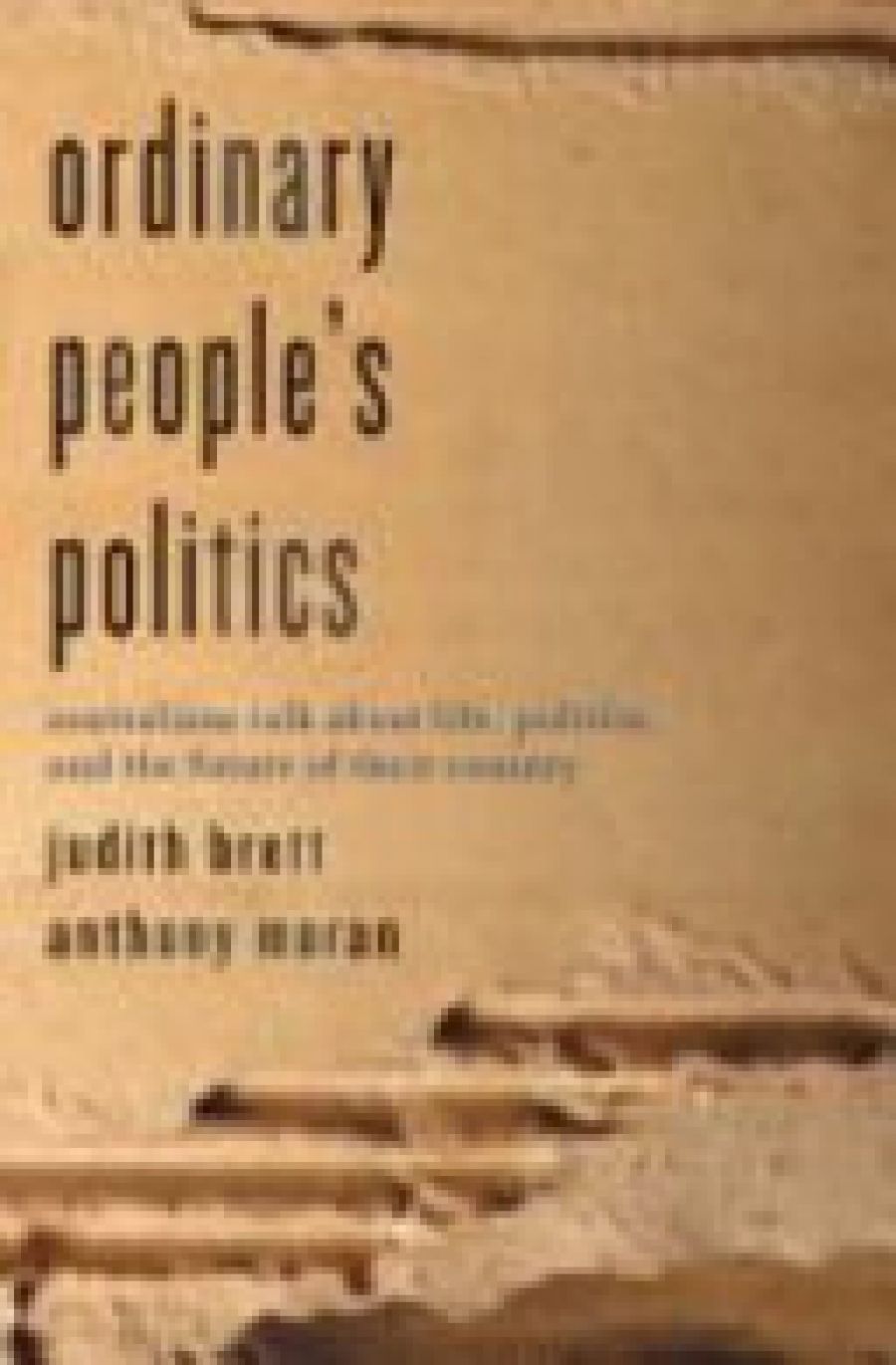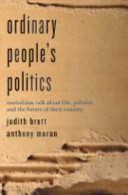
- Free Article: No
- Contents Category: Politics
- Review Article: Yes
- Article Title: Dialogue, not diatribes
- Online Only: No
- Custom Highlight Text:
Of late there has been a good deal of agitated conversation about the political attitudes of ordinary Australians. As Judith Brett and Anthony Moran point out in this compelling new book, this has often taken the form of a ‘war of words within the political élites’, with the right using its supposed empathy for everyday people as a weapon against intellectuals, and the left blaming the deficiencies of John Howard’s Australia on the narrow-minded selfishness of ordinary voters. As it is, those of us who live in ordinary outer suburbs can hardly open Melbourne’s Age newspaper without finding ourselves accused of something, from a new Australian ugliness and the death of manners to the decline of civilisation. Mind you, the thought of being spoken for by anything-but-ordinary people like Janet Albrechtsen is even more distasteful.
- Book 1 Title: Ordinary People’s Politics
- Book 1 Subtitle: Australians talk about life, politics, and the future of their country
- Book 1 Biblio: Pluto Press, $32.95 pb, 337 pp
- Book 1 Cover Small (400 x 600):

- Book 1 Cover (800 x 1200):

This is what makes Ordinary People’s Politics such an important book. It shows the benefits of listening to the people with whom you want to engage. It stems from conversations rather than snapshots. Its authors asked people what they thought, but then stayed around to hear their explanations and evidence. This book points to a politics beyond celebration or dismissal. Most of all, it analyses ordinary people’s politics carefully, with a view to capturing exactly what they meant. Brett and Moran write with the calm certainty that comes from curiosity and respect.
The book focuses on twenty-two people, most of them interviewed in the late 1980s, and again between 2002 and 2004. It traces their changing experience of government and the nation, the declining valency of religion and class in their sense of the world, and their unshackling from political organisations, though not from political ideas. It is part collective biography, part political science, part history, and it excels in all three. Brett and Moran understand the nature of remembered history. They place lives in a context that explains why what some of their respondents remember is what they wished had happened and not what did: one of the warmest portraits is of country doctor Don Kennedy, an aspirational man of humble origins, who describes ‘a society more equal than it ever really was’.
Some of the strongest sections of the book concern ideas about race and racism. Where other writers casually and carelessly use terms such as ‘xenophobia’, Brett and Moran write with care and compassion. They struggle to understand the means by which people arrive at conclusions, and share that struggle with their readers. Is Vietnam veteran Mick racist, or simply unsure how to express his ‘genuine curiosity about other people and other cultures’? Is tradesman Wayne a bigot, or is his wariness about Islam – which is in fact a wariness of all organised religions – the product of a more complicated defence of his conviction that religion has no place in the political sphere?
This is a deeply rewarding and humbling book. It is also deeply troubling, and sets out a significant challenge. Perhaps the most common element in these ordinary understandings of the world is a commitment to individualism and self-reliance. Australia is a place, most say, where you can be free and independent. This version of freedom and independence speaks of powerful aspirations and values. People cherish their ability to be themselves. They cherish their mobility, their privacy and their autonomy, some of the twentieth century’s most significant victories for ordinary people. But only a few of those who speak in this book seem to have any response at all to the problem of interdependence, to the fact that it is impossible to achieve, enjoy and maintain all of this personal freedom without constant support from others. Nor do they provide much room for the fact of dependence, beyond those whose claims upon all of us are unquestionable, such as the aged and the ‘really ill’.
One consequence is that people can be very hard on themselves – and even harder on others – at times of failure. Many of the people who feature in this book cannot imagine ever becoming a victim, or have much regard for what Brett and Moran call ‘the limiting facts of structure’. Only a few grasp the limits of personal responsibility and agency in the face of trial. It is an important point, and needs to be understood in its complexity. People are not being cruel or dismissive; instead, they are judging all others as they would judge themselves, by a yardstick of effort, willingness and commitment that seems to them reasonable. There is something powerfully egalitarian in that, but there is also a profound unwillingness to see that some others won’t always and might never match those standards.
But Ordinary People’s Politics also shows a way forward. If it deepens our understanding of everyday arguments, it provides clues on how we might engage with them. On the specific issues of interdependence and dependence, for example, the story of Don Kennedy shows how firsthand experience of suffering develops a regard for ‘the inexplicable kindness of strangers’, which can ‘banish forever the fear of dependency’, while Tjaart Reinkman learned something about injustice by witnessing the plight of some indigenous people. We could not and should not hope to generalise Don’s suffering, nor insist that all must see the injustice that Tjaart did. Somehow, though, by telling true stories and by engaging respectfully with ordinary people’s politics, we need to explore ways of connecting with common knowledge and experience, with a view to establishing the regard for the collective underpinnings of personal independence that Don, Tjaart and a few others had learned. Perhaps the hardest part will be ensuring that this is a dialogue, not a diatribe. Thankfully, it is a task informed and improved by the care and intelligence that has produced this account of how and why some conclusions about the world have come to dominate others.


Comments powered by CComment